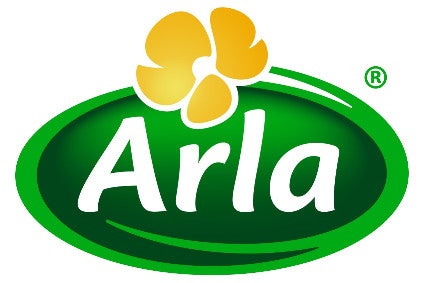
European dairy giant Arla Foods is planning to drastically reduce carbon emissions as part of the battle to fight climate change.
Its plan is to cut carbon emissions by 30% per kilo of milk by 2030.

Discover B2B Marketing That Performs
Combine business intelligence and editorial excellence to reach engaged professionals across 36 leading media platforms.
The Danish cooperative said its long-term ambition is that by 2050 its operations will be carbon net zero with any unavoidable emissions offset by improvements elsewhere in the supply chain.
It said the measures cover the entire value chain of milk from a cow to consumer. The target has been set for all market areas and all territories in which it operates.
Arla plans to switch to more sustainable operations such as renewable energy, sustainable packaging and lower waste production, while farmers can plant more trees and bushes to help absorb carbon and improve biodiversity.
It said it also plans to balance nitrogen and phosphorus cycles to support clean water systems.

US Tariffs are shifting - will you react or anticipate?
Don’t let policy changes catch you off guard. Stay proactive with real-time data and expert analysis.
By GlobalDataHowever, it could mean a rise in prices. Arla chief executive Peder Tuborgh said: “We believe that a growing number of consumers are willing to reward the most sustainable dairy farmers by paying a little more for their milk in the same way as we have seen with organic dairy.”
Arla, owned by 10,300 farmers, suggested business growth can be achieved without environmental impact. While Arla has managed more than 40% more milk since 2005, its CO2 emissions have reduced by 22% across production and packaging and on farms CO2 emissions per kilo of milk have reduced by 24% since 1990.
Arla Foods UK managing director Ash Amirahmadi said: “One of the greatest challenges facing us all is providing natural, nutritious food for a growing population whilst reducing our collective impact on the world around us. Arla has already shown this is possible and the new ambitions announced today will ensure Arla’s farmers, production sites and products continue to play their part in developing a sustainable world for everyone.”
The business said meeting its targets will require radical changes across its business in the decades to come but has pointed to initiatives already in place such as the first carbon net zero milk processing facility in the world at Aylesbury in the UK.
It also points to a 48% reduction in Arla’s UK plastic carbon footprint – equivalent to 72,937 tonnes since 2005 or taking over two million four pint milk bottles off the shelf.
Arla has achieved this by reducing the weight of its standard milk bottles by 25.5% and using up to 40% recycled plastic in them, and making 84% of the packaging produced in the UK recyclable.
Some 90% of cows owned by Arla’s UK farmer owners graze on grass outdoors. On average, these cows graze for 16 hours a day 180 days of the year. Grazing is just one of many land management systems that helps absorb carbon dioxide out of the atmosphere.
However, Arla’s milk production will still emit methane, a greenhouse gas which is produced through cows’ digestion. The company said it is looking into the cows’ feed composition to make them less ‘gassy’.
Livestock farming is responsible for up to 18% of the greenhouse gases that contribute to global warming, according to the United Nations.
On Friday (8 March), another Denmark-based business, meat cooperative Danish Crown, announced goals to improve its impact on climate.





